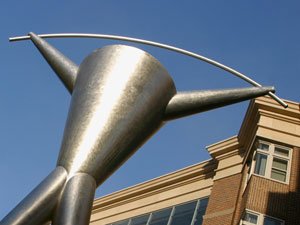Ph.D. programs fare well in National Research Council Assessment

Contacts:
Daniel Wolter, University News Service, wolter@umn.edu, (612) 624-5551
MINNEAPOLIS / ST. PAUL (09/28/2010) —In arguably one of the most comprehensive reviews of doctoral programs in history, the University of Minnesota performed well, University officials said today. Sixty-nine of the University's more than 100 doctoral programs were ranked in the assessment, which provides universities across the country with a range of quantitative data so they can improve graduate education. University officials said they believe the number of U of M programs assessed -- 69 Ph.D. programs -- is the second highest of any university out of the 212 that participated in the study, showing the breadth and quality of the institution.
"Our goal as one world's most comprehensive public research universities is to offer an outstanding graduate education across a range of disciplines," said Provost Tom Sullivan. "I am encouraged that the assessment shows our strengths, with over 60 percent of our programs crossing the top 25 percent nationally, across a wide range of doctoral programs in agriculture, engineering, humanities, sciences and social sciences. The data will be a part of our ongoing process to support and improve graduate education at the University of Minnesota."
Sullivan noted that although the National Research Council (NRC) assessment is based on data from 2005, it will serve as a valuable measurement starting point as 2005 was just at the beginning of the University’s landmark strategic positioning work, which included restructuring of a number of colleges and graduate education.
Among the top assessed programs were Aerospace Engineering and Mechanics; Chemical Engineering; Chemistry; Child Psychology; Civil Engineering; Ecology, Evolution and Behavior; Entomology; Food Science; Germanic Studies; Kinesiology; Materials Science and Engineering; Mechanical Engineering; Natural Resource Science and Management; and, Psychology.
"While the NRC data does not provide the kind of rankings used in the popular press; rather, the NRC does give us ranges of ratings to see where we stack up - and volumes of important information that can be used to help us continue to improve the quality of graduate education," said Henning Schroeder, the University's dean of graduate education.
The University of Minnesota College of Science and Engineering's Ph.D. programs fared particularly well with nearly half of the college's programs ranking as high as within the upper 10 percent of their respective peer groups in the 2010 NRC assessment.
"This is a clear testament to years of hard work and dedication by the faculty, staff, and students in our departments," said Steven L. Crouch, dean of the College of Science and Engineering. "On behalf of the college, I want to congratulate the departments on this outstanding accomplishment."
"My colleagues and I are pleased to see that so many doctoral programs across the University have done so well," said Professor Gary Balas, chair of the aerospace engineering and mechanics department, which was rated as one of the best in the country by the NRC assessment. "The assessment clearly demonstrates that we're a productive faculty with close attention to seeing that our graduate students succeed. With such a need today for cross-disciplinary problem solving, the U is uniquely positioned to lead the way forward."
More information on the U of M's showing in the 2010 NRC assessment can be found at: http://www.grad.umn.edu/transition/nrc/nrc.html.
